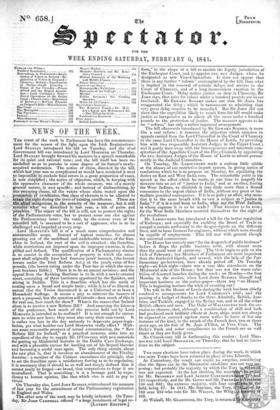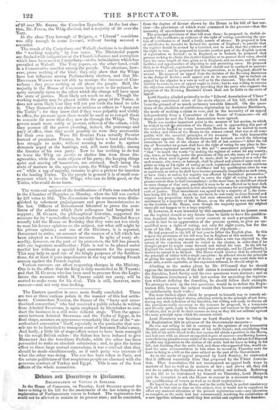Two more elections have taken place during the week, in
which two more Tories hue been returned in place of two Liberals. Two more elections have taken place during the week, in which two more Tories hue been returned in place of two Liberals.
At Canterbury, the result can excite no surprise, considering that the figure cut by the Ministerial candidate was not ve posing ; but probably the majority by which the Tory i was not expected. At the last election, the num for Mr. BRADSHAW and Lord ALBERT CONYNGHAM 754 respectively, and for Mr. GIPPS and Mr. FREDE 750 and 692; the extreme majority, with four can field, being 67. In 1841, Mr. SMYTHE, the Tory, 782 over 619 who vote for Mr. WILSON, the Whig ; 163.
At Walsall, Mr. Gransvoris, the Tory, is returned a)ority
of 27 over Mr. Sarni, the Corn-law Repealer. At the last elec- tion, Mr. FINCH, the Whig-Radical, bad a majority of 20 over the 'Tory.
In the close Tory borough of Reigate, a "Liberal" candidate was silly enough to come forward, without having secured a seconder.
The result of the Canterbury and Walsall elections is to diminish the " working majority" by four votes. The Ministerial papers are flushed with indignation at the Church influence and corruption which have been used at Canterbury—at the intimidation which has prevailed at Walsall. The Tory papers, on the other hand, exult in a Conservative reaction among the people. The elections, how- ever, prove nothing of the kind : they only show that the Whigs have lost influence among Parliamentary electors, and that Mr. HENNIKER WILSON was not able to manage the freemen of Can- terbury : they prove nothing at all about the people. Still, the majority in the House of Commons being now so far reduced, in- quiry naturally turns to the effect which the change will have upon the state of parties. Most likely not much on any. Though the working majority may he placed within the grasp of the Tories, it does not seem likely twat they will yet put forth the hand to take it. They themselves are almost as anxious as others to "keep out the Tories"; for they know that if they were palpably and visibly in office, the pressure upon them would be such as to compel them to concede far more than they now do through the Whigs. They govern much more safely at present, relieved of the odium, while they possess all the power (wanting, indeed, the patronage and pay) of office, than they could possibly do were they answerable for their own acts. Were Sir ROBERT PEEL actually Premier instead of proximate Premier, he would have a hard and thank- less struggle to make, without seeming to make it, against demands urged at the bustings, and, still more forcibly, among the fanatics of his own party. Now he has nothing to do but to leave the Whig vis inertia to shelter him from those dis- agreeables, while the main objects of his party, the keeping things quiet and staving off innovation, are attained. Such being the state of matters in the opposite camp, the Whigs will even " rub on " while a rag of majority remains to give a pretext for inaction to the leading Tories. To the people in general it is of small con- sequence which is in—the Whigs, who can do little good, or the Tories, who could do no harm.



























